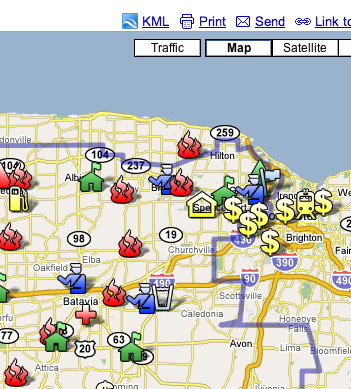We came across Rep. Tom Reynolds' (NY-26) google map of his earmarks a little while ago, and it appears that someone really went above and beyond in showing info about the district. Frankly, I’m completely unfamiliar with the issues or politics of this district, and I don’t even know if this is a comprehensive list of directed spending or just a few of their favorites, but this is pretty compelling stuff (keep going, though. it gets better.) :
Continue reading
Feed Blending: Sunlight and Congress
I enjoy modifying structures responsible for the form our awareness takes, that’s one of the reasons I was initially drawn to examine the availability of public information. In making the transition to working full time on transparency advocacy, I spent a great deal of time restructuring my information consumption habits. Politics and government function through a complex information economy, and one’s profile as an information consumer (and creator) can dictate your relevance. Blogs and the Internet only increase this trend, so the information ecosystems we rely on demand more customization and cultivation.
One of the tools I rely on to stay aware is netvibes. Several similar aggregators work basically the same, and I’m accustomed to this one. Feed aggregators’ usefullness is multiplied by services like yahoo pipes, which allow multiple feeds to be combined, or even transformed with basic operations and filters. My favorite pipe is the blended Sunlight Foundation feed, an option on the left side of sunlightfoundation.com, which lets me follow every post from all of the Sunlight Foundation blogs, along with citations from Paul Blumenthal’s Ethics Watch, featuring links to ethics articles, often from the Hill and Roll Call.
Continue readingLibrary of Congress Website Upgrade
Via the Library of Congress blog, it looks like the LOC Website will be getting an upgrade in the coming weeks. They make a good point about choosing between providing RSS feeds and email updates, noting that many more people use email than RSS:
While only a fraction of people on the Web use RSS feeds, something like 100 percent of them use email, and this is just another part of our efforts to get information to people in the way that is most useful to them. You can get a sense for how the email updates will function by looking at the FBI’s Web site.
Happily, they’re not choosing between the two, and have a pretty broad set of RSS feeds already on offer on their RSS page.
Continue readingSenate Legislative Branch Appropriations Review
(Cross-posted from the Open House Project blog.)
The Senate Legislative Branch Appropriations Bill (reported out of committee on June 21st) provides a revealing look into the priorities that Congress sets in funding its own operations. The House and Senate pass separate appropriations bills; this page on THOMAS organizes the appropriations bills for each fiscal year in a remarkably useful manner.
 While the majority side of the Senate Appropriations committee did include a brief review of their bill (as did their House counterpart), I’d like to give my impressions of the appropriations from the perspective of an advocate for public access and transparency, using the Senate report as a guide. (The Republican websites don’t feature any press releases, which isn’t surprising, given the minority’s smaller staff and budget, comparative lack of clout in controlling committee functioning, and their opportunity to add dissenting views to the report, as I discovered in reading the House report.)
While the majority side of the Senate Appropriations committee did include a brief review of their bill (as did their House counterpart), I’d like to give my impressions of the appropriations from the perspective of an advocate for public access and transparency, using the Senate report as a guide. (The Republican websites don’t feature any press releases, which isn’t surprising, given the minority’s smaller staff and budget, comparative lack of clout in controlling committee functioning, and their opportunity to add dissenting views to the report, as I discovered in reading the House report.)
Carl Malamud Strikes Again
From O’Reilly Radar on Sunday and the New York Times, it looks like Carl Malamud’s been busy, this time working to get legal decisions released into the public domain. As Tim O’Reilly notes, Carl has a great track record in asserting the public-nature of public information, by digitizing large amounts of information normally accessed under a fee or other limitation, and then releasing it into the public domain to force the issue.
Both pieces cited above provide extensive background on Carl’s work, including information about his recent success in getting four congressional committees to upload high resolution video for public consumption, helping move toward one of the Open House Project goals: free and open video access to digitized congressional hearings and floor activity.
- « Previous
- 1
- …
- 30
- 31
- 32


